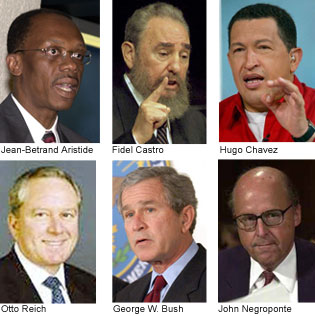Why Haiti? Why now?
By J. Damu-Guest Columnist- | Last updated: Mar 15, 2004 - 10:45:00 AM
What's your opinion on this article?

‘The removal of Pres. Aristide has been a long simmering coup in the making that dates back at least to the Clinton presidency and the refusal of Congress to release promised funding to the economically devastated island. However, the timing and execution of the Haitian coup has to be placed within a regional and world context.’ |
NEWS COMMENTARY
Despite this moral outrage committed against the long suffering people of Haiti, the first anywhere to successfully rise up against their slave masters—an act of defiance for which they’ve never been forgiven—the questions asked by many protestors, as hundreds streamed from San Francisco’s underground rail system to demonstrate against President George Bush, were "Why Haiti?" and "Why now?"
Both questions can be answered simply and succinctly with just two words—Cuba, Venezuela.
The removal of Pres. Aristide has been a long simmering coup in the making that dates back at least to the Clinton presidency and the refusal of Congress to release promised funding to the economically devastated island. However, the timing and execution of the Haitian coup has to be placed within a regional and world context. The "coup," or extra-democratic process, which brought George Bush to the White House, allowed him to hand over U.S. foreign policy decision-making, as it affects the Western Hemisphere, to naturalized U.S. Cubans dedicated to the overthrow of the Cuban Revolution.
Their policies, although geared to the overthrow of Fidel Castro and socialism in Cuba, converge neatly with U.S. designs to destabilize the Caribbean and Central-South American region and insure U.S. supremacy and access to Venezuela’s all-important oil.
Therefore, it is no surprise Otto Juan Reich’s fingerprints are all over the exile of President Aristide. Otto Reich is the Under-Secretary of State for the Western Hemisphere who helped to orchestrate the short-lived ouster of Venezuelan president Hugo Chavez. That kidnapping was undone when the people rose up and re-installed Mr. Chavez, because the perpetrators had failed to remove him completely from the country. Not to make the same mistake twice.
In an overall strategy that parallels the worldwide concept of the Department of Defense—to simultaneously fight wars to extend U.S. imperial power to control energy sources overseas, under the cover of fighting terrorism—hard-line, reactionary Cubans within the U.S. diplomatic community have been handed near carte blanche powers to destabilize progressive regimes in the Western Hemisphere.
Otto Reich, as a diplomatic appointee to Venezuela during the Reagan administration, helped to arrange the transferring from Venezuela and releasing to U.S. streets of Orlando Bosch, who was convicted for the 1976 blowing up of a Cuban airliner. Mr. Reich’s right-hand man is Roger Noriega, a former Jesse Helms protege who recently served as U.S. ambassador to the Organization of American States and now also to the State Department’s Western Hemisphere Bureau. By his side is also John Negroponte, U.S. ambassador to the United Nations, who also, as a Reagan appointee, served as U.S. ambassador to Honduras. He officially covered up, if not actually facilitated, the death squads there in support of that country’s actions against Nicaragua’s Sandinista government.
There can be little doubt all three of these men, with common roots in the hard-line Florida community of Cuban exiles inside and outside the U.S., played key roles in facilitating the recent events in Haiti. For instance, it is widely known that the leadership of the so-called Haitian rebels, Guy Phillippe, Emanuel Constant and Jodel Chamblain, were all trained at the U.S.-held Manta airbase in Ecuador.
This military installation, developed with U.S. funds ostensibly to help launch strikes in the war against the drug trade, is being used as a training and staging area for paramilitary and military operations in the region—much as Panama’s Howard airbase was previously used, according to former U.S. military’s Southern Command chief, General Charles Wilhelm. Published news accounts say all three men occupied the same house at Manta airbase during their training there and Constant admits to being on the CIA payroll for some years now.
Of course, there is an entire constellation of Haitian and U.S. characters and organizations, as well as international policy and funding organizations, that helped create the machinery and climate for Pres. Aristide’s kidnapping, and also serve to diffuse attention from the Cuban right-wing policymakers.
The overthrow of Pres. Aristide was relatively simple to physically accomplish, but the larger message was to Cuba and Venezuela, and even to Brazil—that dangerous times lie immediately ahead.
(J. Damu is the acting Western Regional Representative for N’COBRA, the National Coalition of Blacks for Reparations in America. For more information about how you can help Haiti or to become involved, please contact the Haiti Action Committee at (510) 483-7481 or write HAC, P.O. Box 2218, Berkeley, Ca. 94702 or visit their website www.haitiaction.org.)
Related news:
Defying Washington: Haiti's Aristide Returns to the Caribbean (DemocracyNow, 03/15/2004)
Aristide's Call for Reparations From France Unlikely to Die (IPS, 03/12/2004)
Angry members of CBC meet at the UN on Haiti (FCN, 03/06/2004)
How the U.S. impoverished Haiti (FCN, 09-10-2003)
INSIDE STORIES AND REVIEWS
-
-
About Harriett ... and the Negro Hollywood Road Show
By Rabiah Muhammad, Guest Columnist » Full Story -
Skepticism greets Jay-Z, NFL talk of inspiring change
By Bryan 18X Crawford and Richard B. Muhammad The Final Call Newspaper @TheFinalCall » Full Story -
The painful problem of Black girls and suicide
By Charlene Muhammad -National Correspondent- » Full Story -
Exploitation of Innocence - Report: Perceptions, policies hurting Black girls
By Charlene Muhammad -National Correspondent- » Full Story -
Big Ballin: Big ideas fuel a father’s Big Baller Brand and brash business sense
By Bryan Crawford -Contributing Writer- » Full Story






 Click Here Stay Connected!
Click Here Stay Connected!








